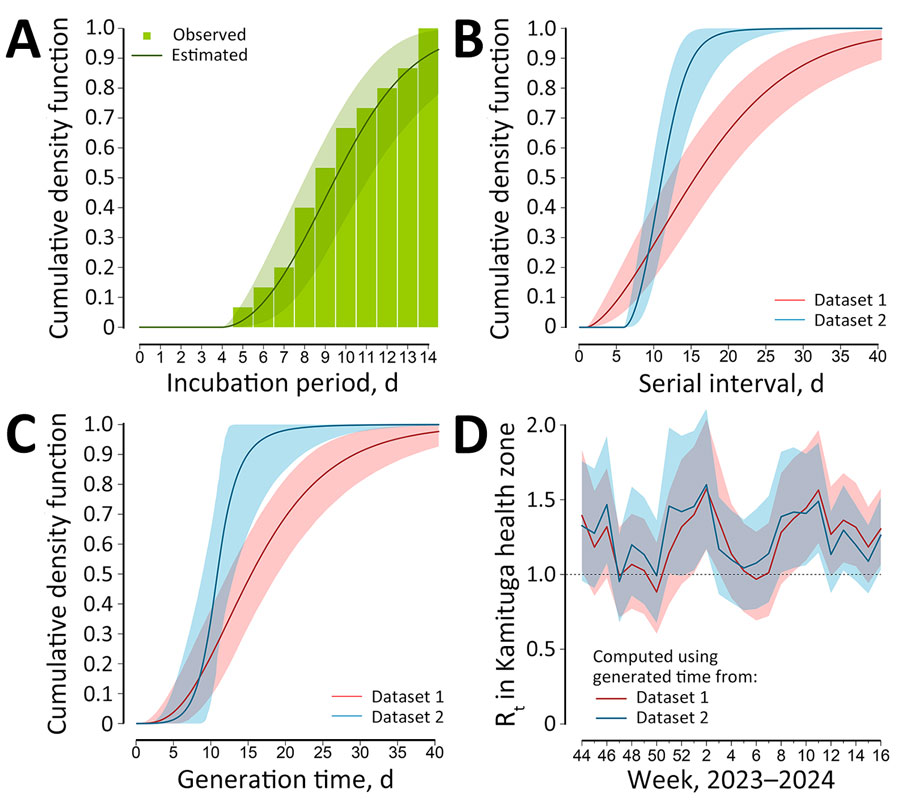Volume 30, Number 10—October 2024
Research
Epidemiologic Quantities for Monkeypox Virus Clade I from Historical Data with Implications for Current Outbreaks, Democratic Republic of the Congo
Figure

Figure. Estimates of key epidemiologic parameters for monkeypox virus clade I from historical data with implications for current outbreaks, Democratic Republic of the Congo. A) Cumulative density function of the incubation period, estimated from data on 15 cases reported in a previous study (7). B) Cumulative density function of the serial interval, estimated from data on 32 transmission links associated with household outbreaks (8,9), and on data on 11 transmission links associated with a hospital outbreak (10). C) Cumulative density function of the estimated generation time, based on the same data reported for the serial interval and on estimates of the incubation period. D) Estimates of Rt in the Kamituga Health Zone, obtained from the time-series of hospitalized cases (suspected, probable, and confirmed) (L.M. Masirika et al., unpub. data, https://www.medrxiv.org/content/10.1101/2024.05.10.24307057v1) and using the 2 estimates of the generation times. Lines indicate mean estimates; shaded areas indicate 95% credible intervals. Rt, time-varying reproduction number.
References
- World Health Organization. Mpox—Democratic Republic of the Congo [cited 2024 Jun 25]. https://www.who.int/emergencies/disease-outbreak-news/item/2024-DON522
- World Health Organization. Mpox (monkeypox) outbreak 2022 [cited 2024 Jun 25]. https://www.who.int/emergencies/situations/monkeypox-oubreak-2022
- Kibungu EM, Vakaniaki EH, Kinganda-Lusamaki E, Kalonji-Mukendi T, Pukuta E, Hoff NA, et al.; International Mpox Research Consortium. Clade I–associated mpox cases associated with sexual contact, the Democratic Republic of the Congo. Emerg Infect Dis. 2024;30:172–6. DOIPubMedGoogle Scholar
- Katoto PD, Muttamba W, Bahizire E, Malembaka EB, Bosa HK, Kazadi DM, et al. Shifting transmission patterns of human mpox in South Kivu, DR Congo. Lancet Infect Dis. 2024;24:e354–5. DOIPubMedGoogle Scholar
- Vakaniaki EH, Kacita C, Kinganda-Lusamaki E, O’Toole Á, Wawina-Bokalanga T, Mukadi-Bamuleka D, et al. Sustained human outbreak of a new MPXV clade I lineage in eastern Democratic Republic of the Congo. Nat Med. 2024; Epub ahead of print. DOIPubMedGoogle Scholar
- Masirika LM, Udahemuka JC, Schuele L, Ndishimye P, Otani S, Mbiribindi JB, et al. Ongoing mpox outbreak in Kamituga, South Kivu province, associated with monkeypox virus of a novel Clade I sub-lineage, Democratic Republic of the Congo, 2024. Euro Surveill. 2024;29:
2400106 . DOIPubMedGoogle Scholar - Nolen LD, Osadebe L, Katomba J, Likofata J, Mukadi D, Monroe B, et al. Extended human-to-human transmission during a monkeypox outbreak in the Democratic Republic of the Congo. Emerg Infect Dis. 2016;22:1014–21. DOIPubMedGoogle Scholar
- Formenty P, Muntasir MO, Damon I, Chowdhary V, Opoka ML, Monimart C, et al. Human monkeypox outbreak caused by novel virus belonging to Congo Basin clade, Sudan, 2005. Emerg Infect Dis. 2010;16:1539–45. DOIPubMedGoogle Scholar
- Besombes C, Mbrenga F, Malaka C, Gonofio E, Schaeffer L, Konamna X, et al. Investigation of a mpox outbreak in Central African Republic, 2021-2022. One Health. 2023;16:
100523 . DOIPubMedGoogle Scholar - Learned LA, Reynolds MG, Wassa DW, Li Y, Olson VA, Karem K, et al. Extended interhuman transmission of monkeypox in a hospital community in the Republic of the Congo, 2003. Am J Trop Med Hyg. 2005;73:428–34. DOIPubMedGoogle Scholar
- Miura F, van Ewijk CE, Backer JA, Xiridou M, Franz E, Op de Coul E, et al. Estimated incubation period for monkeypox cases confirmed in the Netherlands, May 2022. Euro Surveill. 2022;27:
2200448 . DOIPubMedGoogle Scholar - Guzzetta G, Mammone A, Ferraro F, Caraglia A, Rapiti A, Marziano V, et al. Early estimates of monkeypox incubation period, generation time, and reproduction number, Italy, May–June 2022. Emerg Infect Dis. 2022;28:2078–81. DOIPubMedGoogle Scholar
- Monkeypox in the Democratic Republic of the Congo: epidemiological situation report sitrep no. 014 (06–12 May 2024) [in French] [cited 2024 Jun 25]. https://reliefweb.int/report/democratic-republic-congo/la-variole-simienne-monkeypox-en-republique-democratique-du-congo-rapport-de-la-situation-epidemiologique-sitrep-no014-06-12-mai-2024
- Cori A, Ferguson NM, Fraser C, Cauchemez S. A new framework and software to estimate time-varying reproduction numbers during epidemics. Am J Epidemiol. 2013;178:1505–12. DOIPubMedGoogle Scholar
- Thompson RN, Stockwin JE, van Gaalen RD, Polonsky JA, Kamvar ZN, Demarsh PA, et al. Improved inference of time-varying reproduction numbers during infectious disease outbreaks. Epidemics. 2019;29:
100356 . DOIPubMedGoogle Scholar - Wallinga J, Lipsitch M. How generation intervals shape the relationship between growth rates and reproductive numbers. Proc Biol Sci. 2007;274:599–604. DOIPubMedGoogle Scholar
- World Health Organization. 2022–24 mpox (monkeypox) outbreak: global trends. Literature summary & epidemic parameters [cited 2024 Jun 25]. https://worldhealthorg.shinyapps.io/mpx_global/#6_Literature_summary__epidemic_parameters
- Brosius I, Van Dijck C, Coppens J, Vandenhove L, Bangwen E, Vanroye F, et al.; ITM MPOX Study Group. Presymptomatic viral shedding in high-risk mpox contacts: A prospective cohort study. J Med Virol. 2023;95:
e28769 . DOIPubMedGoogle Scholar - Miura F, Backer JA, van Rijckevorsel G, Bavalia R, Raven S, Petrignani M, et al.; Dutch Mpox Response Team. Time scales of human mpox transmission in the Netherlands. J Infect Dis. 2024;229:800–4. DOIPubMedGoogle Scholar
- Fine PEM, Jezek Z, Grab B, Dixon H. The transmission potential of monkeypox virus in human populations. Int J Epidemiol. 1988;17:643–50. DOIPubMedGoogle Scholar
- Sun YQ, Chen JJ, Liu MC, Zhang YY, Wang T, Che TL, et al. Mapping global zoonotic niche and interregional transmission risk of monkeypox: a retrospective observational study. Global Health. 2023;19:58. DOIPubMedGoogle Scholar
- Charniga K, McCollum AM, Hughes CM, Monroe B, Kabamba J, Lushima RS, et al. Updating reproduction number estimates for mpox in the Democratic Republic of Congo using surveillance data. Am J Trop Med Hyg. 2024;110:561–8. DOIPubMedGoogle Scholar
- Johnson PLF, Bergstrom CT, Regoes RR, Longini IM, Halloran ME, Antia R. Evolutionary consequences of delaying intervention for monkeypox. Lancet. 2022;400:1191–3. DOIPubMedGoogle Scholar
1These senior authors contributed equally to this article.